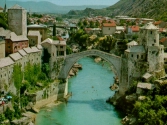... ALIJA IZETBEGOVIC: THE LAST TIME = ONCE MORE?
Goodbye or ...? Alija Izetbegovic announced on June 6, 2000 his
retirement from the state politics. Surprise or?
Stating his age (old age and health) and pressures from the
International Community as reasons for this decision, Izetbegovic will
be leaving in autumn. In October - retirement. Izetbegovic talked about
leaving before. In 1997 and 1998 Izetbegovic was a candidate at the
Presidential elections for "the last time". Except "the last time"
always meant "once more" in his case.
Is that going to happen this time also?
Times are changing. Izetbegovic was clever enough not to give the real
reasons for his withdrawal. But things are quite known these days. The
reasons are known even before Izetbegovic starts talking about them. If
he decides to talk about them at all.
It was clear that Izetbegovic was forced to renew his candidatures. SDA
in 1997. and 1998. did not have a candidate strong enough to beat the
opposition candidates. Alija was still a winner. After the defeat in the
2000.local elections, it became clear that even the No.1 Bosniak cannot
save SDA from falling apart. Izetbegovic will not allow himself to
participate in one more election and be defeated.
But the conflicts within the party itself are growing. The influence of
the radicals is also getting stronger and they do not wish to accept
Izetbegovic's attitude.
And the International Community will be very happy to see someone
younger and liberal in the Bosnian Presidency, someone without the war
leadership in the his CV. October will definitely confirm Izetbegovic's
intention stated on a historic June 6, 2000. November will bring the
election results. As well as the confirmation of the fact about the
continuation of "After Tito - Tito" and "After Alija - Alija" ruling
philosophy.
... DEATH PENALTY BEHIND THE BACK
The 11th session of the Republic of Srpska National Assembly took place
in Banja Luka at the end of the month. That news could have been totally
irrelevant (keeping in mind the unproductivity and unefficiency of local
meetings and sessions) if Cedo Vrzina, Justice Minister in the RS
government, hadn't made a new RS criminal law proposal. And the proposal
demands, among other things, replacement of death penalty (which is
still valid in the smaller Bosnian entity) with a life-long sentence.
According to Vrzina, the change of this law would perform a reform of
the criminal law in general. Aside from that, continues Vrzina, the
current legal system would be free of articles that have been taken from
the former system. Judging from all this, it is somebody's intention to
place Bosnia and Herzegovina among those countries who like to call
themselves civilized. Good! If the solution is possible only through
avoiding the previous system and it's law. The problem (of the
society?) is much deeper and more complexed.
By the new law, the death penalty should be changed into a life in
prison. This has been done in the Federation earlier. During the war
there were many polemics about the justification (humanity?) of a death
penalty. This did not stop some people from performing the death penalty
before it was judged (and we see today that there were a lot of people
like that). The "stars" of this discussion were Borislav Herak and
Srecko Damjanovic, war prisoners in 1993, the first ones to be
officially sentenced to death (because of the brutal crimes committed
against Bosniak and Croat population around Sarajevo. Herak's testimony
about his own sins shocked everyone with a human feeling). The death
penalty was constantly prolonged and eventually "the justice was
satisfied" with an inprisonment. For life, if my memory serves me
correctly.
Abolition of death penalty in RS law is an extra plus for the government
and it's effort to bring Bosnia and Herzegovina into the Council of
Europe. As a reminder - last year the European Council sent to the
Bosnian government a list of 43 demands that need to be fulfiled before
Bosnian official entrance in Europe. Recently there was a statement from
the same institution saying that only 9 demands have been fulfiled. And
6 of them have been imposed by the High Representative of International
Community in BiH.
The same day the request for abolishing the death penalty was submitted
in RS Assembly, which is in the small, wild Bosnia and Herzegovina, a
death sentence was performed in America, the country of "justice for
all". The prisoner was Shaka Sankofo (Gary Graham). Absurd. It is the
same country which makes Dayton agreements, threatens like a big
policeman, brings peace with bombs and talks about human rights at the
same time. As a reaction to Sankof's execution, the New York
International Action Center (http://.www.iacenter.org) gave a public
statement. We give you a part of this statement, the part which shows
what kind of "human rights" we are talking about:
"The black and the white people are victims in equal number of cases,
but 82% of those who were executed were accused for killing white
people. According to Amnesty International information, only six white
persons were executed for killing black people since the year 1977. when
the law on death sentence has been renewed in the US..."
Don't get me wrong, the point of this is not that more white or more
black (what ugly terms!) people should be killed in order to "please the
justice".
... BOSNIAN BERLIN WRITTEN IN CYRILLIC
 Lately, Mostar has been present in the local media with various themes
but the same context. Bosnian Berlin - yes or no. Bosnian Berlin - is
there a future. A few Mostar clips:
Radio FREE EUROPE organized a radio line which involved Safet Orucevic
and Neven Tomic, the mayor and deputy mayor of Mostar, with moderator
Omer Karabeg. If we are to judge from the conversation, according to
Orucevic, recently distant from SDA politics, and Tomic, the most
liberal of all HDZ candidates, "Mostar has a chance to become Berlin.
After the fall of the wall..." Unlike Berline, there is still a wall
which is a frequent guest in this Neretva city.
A unique bus line began to work in Mostar. The city, artificially
divided to Eastern and Western part, is being brought together with
buses that are going through the WHOLE city. I know this may sound
strange to someone, even absurd - one, unique bus line, but in Mostar
case it seems to be one way of dealing with the absurd. Simbolicly (and
true), a bus drive around thwe city is for free. No tickets - freedom of
movement guaranteed and available to everyone.
There is a ten-day long MOSTAR INTERCULTURAL FESTIVAL 2000 - Herzegovian
alternative meetings taking place in Mostar. And then the same thing,
but in cyrillic. The festival with a programme containing concerts,
exibits, video projections, street performances, sound installations...
>From 27.06. to 08.07., written in Cyrillic and Latin, in "Bosnian"
Berlin, with participants from BiH, FR Yugoslavia, Croatia, Spain and
France. And with information on mostar-interkultural-festivalagmx.net
Lately, Mostar has been present in the local media with various themes
but the same context. Bosnian Berlin - yes or no. Bosnian Berlin - is
there a future. A few Mostar clips:
Radio FREE EUROPE organized a radio line which involved Safet Orucevic
and Neven Tomic, the mayor and deputy mayor of Mostar, with moderator
Omer Karabeg. If we are to judge from the conversation, according to
Orucevic, recently distant from SDA politics, and Tomic, the most
liberal of all HDZ candidates, "Mostar has a chance to become Berlin.
After the fall of the wall..." Unlike Berline, there is still a wall
which is a frequent guest in this Neretva city.
A unique bus line began to work in Mostar. The city, artificially
divided to Eastern and Western part, is being brought together with
buses that are going through the WHOLE city. I know this may sound
strange to someone, even absurd - one, unique bus line, but in Mostar
case it seems to be one way of dealing with the absurd. Simbolicly (and
true), a bus drive around thwe city is for free. No tickets - freedom of
movement guaranteed and available to everyone.
There is a ten-day long MOSTAR INTERCULTURAL FESTIVAL 2000 - Herzegovian
alternative meetings taking place in Mostar. And then the same thing,
but in cyrillic. The festival with a programme containing concerts,
exibits, video projections, street performances, sound installations...
>From 27.06. to 08.07., written in Cyrillic and Latin, in "Bosnian"
Berlin, with participants from BiH, FR Yugoslavia, Croatia, Spain and
France. And with information on mostar-interkultural-festivalagmx.net
 Lately, Mostar has been present in the local media with various themes
but the same context. Bosnian Berlin - yes or no. Bosnian Berlin - is
there a future. A few Mostar clips:
Radio FREE EUROPE organized a radio line which involved Safet Orucevic
and Neven Tomic, the mayor and deputy mayor of Mostar, with moderator
Omer Karabeg. If we are to judge from the conversation, according to
Orucevic, recently distant from SDA politics, and Tomic, the most
liberal of all HDZ candidates, "Mostar has a chance to become Berlin.
After the fall of the wall..." Unlike Berline, there is still a wall
which is a frequent guest in this Neretva city.
A unique bus line began to work in Mostar. The city, artificially
divided to Eastern and Western part, is being brought together with
buses that are going through the WHOLE city. I know this may sound
strange to someone, even absurd - one, unique bus line, but in Mostar
case it seems to be one way of dealing with the absurd. Simbolicly (and
true), a bus drive around thwe city is for free. No tickets - freedom of
movement guaranteed and available to everyone.
There is a ten-day long MOSTAR INTERCULTURAL FESTIVAL 2000 - Herzegovian
alternative meetings taking place in Mostar. And then the same thing,
but in cyrillic. The festival with a programme containing concerts,
exibits, video projections, street performances, sound installations...
>From 27.06. to 08.07., written in Cyrillic and Latin, in "Bosnian"
Berlin, with participants from BiH, FR Yugoslavia, Croatia, Spain and
France. And with information on mostar-interkultural-festivalagmx.net
Lately, Mostar has been present in the local media with various themes
but the same context. Bosnian Berlin - yes or no. Bosnian Berlin - is
there a future. A few Mostar clips:
Radio FREE EUROPE organized a radio line which involved Safet Orucevic
and Neven Tomic, the mayor and deputy mayor of Mostar, with moderator
Omer Karabeg. If we are to judge from the conversation, according to
Orucevic, recently distant from SDA politics, and Tomic, the most
liberal of all HDZ candidates, "Mostar has a chance to become Berlin.
After the fall of the wall..." Unlike Berline, there is still a wall
which is a frequent guest in this Neretva city.
A unique bus line began to work in Mostar. The city, artificially
divided to Eastern and Western part, is being brought together with
buses that are going through the WHOLE city. I know this may sound
strange to someone, even absurd - one, unique bus line, but in Mostar
case it seems to be one way of dealing with the absurd. Simbolicly (and
true), a bus drive around thwe city is for free. No tickets - freedom of
movement guaranteed and available to everyone.
There is a ten-day long MOSTAR INTERCULTURAL FESTIVAL 2000 - Herzegovian
alternative meetings taking place in Mostar. And then the same thing,
but in cyrillic. The festival with a programme containing concerts,
exibits, video projections, street performances, sound installations...
>From 27.06. to 08.07., written in Cyrillic and Latin, in "Bosnian"
Berlin, with participants from BiH, FR Yugoslavia, Croatia, Spain and
France. And with information on mostar-interkultural-festivalagmx.net
